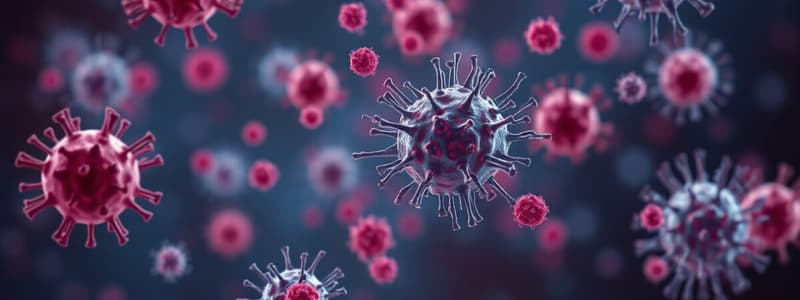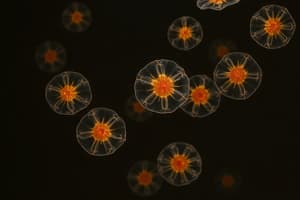Podcast
Questions and Answers
Which of the following properly describes the function of antigen presenting cells (APCs)?
Which of the following properly describes the function of antigen presenting cells (APCs)?
- APCs release cytokines to directly kill foreign cells.
- APCs produce antibodies to neutralize pathogens.
- APCs phagocytose antigens and display them using Major Histocompatibility Complex. (correct)
- APCs are synonymous with T cells.
What role do helper T cells play in cell-mediated immunity?
What role do helper T cells play in cell-mediated immunity?
- They are responsible for clonal selection and expansion of B cells.
- They suppress the immune response.
- They produce cytokines that enhance the activity of other immune cells. (correct)
- They kill infected host cells directly.
Which statement about cytotoxic T cells is accurate?
Which statement about cytotoxic T cells is accurate?
- They function by binding to antigens for clonal selection.
- They regulate the production of antibodies.
- They primarily produce interleukin-10.
- They can utilize the perforin/granzyme system to eliminate cells. (correct)
What happens to the antigen after it is phagocytosed by an APC?
What happens to the antigen after it is phagocytosed by an APC?
What is the normal range for T cell counts in healthy individuals?
What is the normal range for T cell counts in healthy individuals?
Why do B lymphocytes utilize B cell receptors (BCR)?
Why do B lymphocytes utilize B cell receptors (BCR)?
What is the primary function of regulatory T cells (Tregs) in the immune system?
What is the primary function of regulatory T cells (Tregs) in the immune system?
In which process do antigen fragments get displayed on the surface of an APC?
In which process do antigen fragments get displayed on the surface of an APC?
How does the perforin/granzyme system function in immunity?
How does the perforin/granzyme system function in immunity?
What characterizes the immune response of adaptive immunity compared to innate immunity?
What characterizes the immune response of adaptive immunity compared to innate immunity?
Which type of lymphocyte is primarily responsible for producing antibodies?
Which type of lymphocyte is primarily responsible for producing antibodies?
What is the significance of memory cells in adaptive immunity?
What is the significance of memory cells in adaptive immunity?
What does the term 'clonal selection' refer to in the context of adaptive immunity?
What does the term 'clonal selection' refer to in the context of adaptive immunity?
Which of the following is NOT a feature of adaptive immunity?
Which of the following is NOT a feature of adaptive immunity?
During which process do T cells become activated?
During which process do T cells become activated?
Which statement best describes the function of effector cells in the adaptive immune response?
Which statement best describes the function of effector cells in the adaptive immune response?
What is the role of antigen presentation in adaptive immunity?
What is the role of antigen presentation in adaptive immunity?
Which of the following processes occurs first in the adaptive immune system?
Which of the following processes occurs first in the adaptive immune system?
In which organ do T lymphocytes mature?
In which organ do T lymphocytes mature?
Which statement accurately describes the structure of antibodies?
Which statement accurately describes the structure of antibodies?
What role does the fragment crystallizable (Fc) portion of an antibody play?
What role does the fragment crystallizable (Fc) portion of an antibody play?
Which immunoglobulin is known for its ability to cross the placenta?
Which immunoglobulin is known for its ability to cross the placenta?
How many antigen-binding sites does a typical antibody possess?
How many antigen-binding sites does a typical antibody possess?
What distinguishes IgA from other immunoglobulin classes?
What distinguishes IgA from other immunoglobulin classes?
Which type of immunoglobulin accounts for 70-75% of circulating immunoglobulins?
Which type of immunoglobulin accounts for 70-75% of circulating immunoglobulins?
Which statement is true regarding the heavy chains in antibodies?
Which statement is true regarding the heavy chains in antibodies?
What is a characteristic feature of IgM?
What is a characteristic feature of IgM?
Which immunoglobulin class is least understood and characterized by its minor presence in serum?
Which immunoglobulin class is least understood and characterized by its minor presence in serum?
What is the composition of the antigen-binding sites (Fab) in an antibody?
What is the composition of the antigen-binding sites (Fab) in an antibody?
Flashcards
Antigen Presenting Cells (APCs)
Antigen Presenting Cells (APCs)
Immune cells that engulf and break down pathogens, displaying fragments of the pathogen (antigen) on their surface using MHC molecules.
Major Histocompatibility Complex (MHC)
Major Histocompatibility Complex (MHC)
Group of genes that code for proteins on the surface of cells that present antigens to T cells. Two classes, MHC I and MHC II, present antigens to different types of T cells.
What is the role of MHC molecules in antigen presentation?
What is the role of MHC molecules in antigen presentation?
MHC molecules bind to processed antigens and display them on the surface of antigen-presenting cells (APCs), allowing T cells to recognize and respond to the antigen.
What are the steps of antigen presentation?
What are the steps of antigen presentation?
Signup and view all the flashcards
Regulatory T cells (Tregs)
Regulatory T cells (Tregs)
Signup and view all the flashcards
Helper T cells
Helper T cells
Signup and view all the flashcards
Cytotoxic T cells
Cytotoxic T cells
Signup and view all the flashcards
Perforin/Granzyme System in Cytotoxic T cells
Perforin/Granzyme System in Cytotoxic T cells
Signup and view all the flashcards
B Lymphocytes (B Cells)
B Lymphocytes (B Cells)
Signup and view all the flashcards
Humoral Immunity
Humoral Immunity
Signup and view all the flashcards
Adaptive Immunity
Adaptive Immunity
Signup and view all the flashcards
3 Rs of Adaptive Immunity
3 Rs of Adaptive Immunity
Signup and view all the flashcards
Lymphocytes
Lymphocytes
Signup and view all the flashcards
Clonal Selection
Clonal Selection
Signup and view all the flashcards
Antigen Presentation
Antigen Presentation
Signup and view all the flashcards
Cell-mediated Immunity
Cell-mediated Immunity
Signup and view all the flashcards
Antibody-mediated (Humoral) Immunity
Antibody-mediated (Humoral) Immunity
Signup and view all the flashcards
Antibodies
Antibodies
Signup and view all the flashcards
What do B cells produce?
What do B cells produce?
Signup and view all the flashcards
What are antibodies also known as?
What are antibodies also known as?
Signup and view all the flashcards
Describe the antibody structure.
Describe the antibody structure.
Signup and view all the flashcards
What does the Fc fragment do?
What does the Fc fragment do?
Signup and view all the flashcards
How many types of heavy chains are there?
How many types of heavy chains are there?
Signup and view all the flashcards
What is the most abundant antibody in circulation?
What is the most abundant antibody in circulation?
Signup and view all the flashcards
Why is IgM special?
Why is IgM special?
Signup and view all the flashcards
Where is IgA found?
Where is IgA found?
Signup and view all the flashcards
What is significant about IgG?
What is significant about IgG?
Signup and view all the flashcards
What is the role of IgD?
What is the role of IgD?
Signup and view all the flashcards
Study Notes
Adaptive Immunity Lecture
- Adaptive immunity is slower than innate immunity but develops throughout a lifetime
- It is highly specific to antigens
- It has a memory function, meaning it adapts and improves after initial exposure to an antigen and responds more rapidly on subsequent exposure
Adaptive Immunity: The Three Rs
- Recognize: Each cell has a specific receptor for an antigen. Cells from the innate immune system assist with recognition. Recognition is followed by clonal selection
- Respond: This involves cytokine secretion, antibody production, and direct cell killing.
- Remember: Memory cells are created for a faster and stronger response on subsequent exposure to the same antigen
Cells Involved in Adaptive Immunity
- Lymphocytes: Include B Lymphocytes and T Lymphocytes
- B Lymphocytes: Produce antibodies. B cells mature in the bone marrow.
- T Lymphocytes: Involved in cell-mediated immunity. T-cells mature in the thymus.
Clonal Selection
- Each lymphocyte has receptors for a single antigen
- The repertoire of lymphocytes is incredibly diverse
- Few lymphocytes are specific to any one antigen
- Each of these lymphocytes is highly specific
- When an antigen binds to a lymphocyte, the lymphocyte becomes activated, and it begins to rapidly replicate, forming a clone
- This clone differentiates into effector cells and memory cells
Antigen Presentation
- Antigen presenting cells (APCs) introduce antigens to T cells. APCs include phagocytes such as dendritic cells, macrophages, and neutrophils.
- APCs use the Major Histocompatibility Complex (MHC) to display digested antigen fragments on their surface.
- The antigen is phagocytosed by an APC
- Fragments of the antigen are transported to the surface of the APC.
- The antigen is displayed on the MHC Class II molecule for recognition by T cells
T Cell Types
- Helper T cells: Produce cytokines to enhance the activity of B cells, macrophages and other T cells
- Cytotoxic T cells: Kill foreign cells or infected host cells, using perforin/granzyme which are proteins
- Regulatory T cells: Suppress the immune response, produce the anti-inflammatory cytokine interleukin (IL)-10
B Cells and Antibodies (Humoral Immunity)
- B cell receptors (BCRs) are antibodies that bind antigens directly
- BCRs recognize specific epitopes (antigenic determinants) on an antigen
- Following clonal selection and expansion, B cells produce antibodies with the same specificity as their BCR
Antibody Structure
- Antibodies (immunoglobulins) have two identical heavy chains and two identical light chains, arranged in a Y shape
- Each antibody has two antigen-binding sites (Fab regions)
- The stem of the antibody (Fc region) binds to Fc receptors on cells to mediate the physiological effects of antibodies
Antibody Isotypes
- The five classes of antibodies are: IgG, IgM, IgA, IgD, and IgE
- Each has different functions and characteristics
- IgG is the most abundant in the blood
- IgM is the first antibody produced in an immune response
- IgA is found in secretions
- IgD is found on the surface of B cells
- IgE is involved in allergic responses
Antibody Function
- Antibodies have various functions, including neutralization of antigens/toxins, opsonization (marking pathogens for phagocytosis), antibody-dependent cellular cytotoxicity (ADCC) (targets pathogens for destruction by other cells), complement activation, and inflammation
Primary vs. Secondary Antibody Response
- Primary response is a slower response to an initial encounter with an antigen (5-10 days), with lower antibody titres (amounts of antibody present) and mainly IgM type
- Secondary response to subsequent encounter is much faster (1-3 days), with higher antibody titres and mainly IgG type
- Antibody response to second encounter is often more specific (affinity maturation)
Immunologic Memory
- A critical aspect of adaptive immunity
- On a second exposure to the same antigen, the immune response is faster, more extensive, and more effective at eliminating the pathogen compared to the initial response because of memory cells
Studying That Suits You
Use AI to generate personalized quizzes and flashcards to suit your learning preferences.



